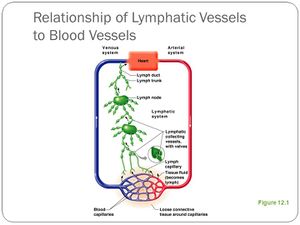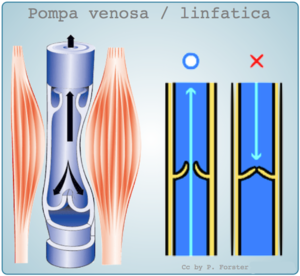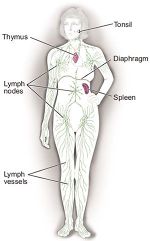Lymphatic System: Difference between revisions
No edit summary |
No edit summary |
||
| Line 1: | Line 1: | ||
This page is under-updating . Sorry for any inconvenience. <div class="editorbox"> '''Original Editor '''- [[User:User Name|Iva]] '''Top Contributors''' - {{Special:Contributors/{{FULLPAGENAME}}}}</div> | This page is under-updating . Sorry for any inconvenience. <div class="editorbox"> '''Original Editor '''- [[User:User Name|Iva]] '''Top Contributors''' - {{Special:Contributors/{{FULLPAGENAME}}}}</div> | ||
[[File:Lym 1.jpg|right|frameless| | [[File:Lym 1.jpg|right|frameless|300x300px]] | ||
== Introduction: == | == Introduction: == | ||
Revision as of 13:33, 10 June 2019
This page is under-updating . Sorry for any inconvenience.
Introduction:[edit | edit source]
Lymph is the fluid that flows through the lymphatic system and surrounds all tissues. It flows through lymphatic vessels and lymph nodes and is part of the immune system that is responsible for removing foreign microbes to lymph nodes and returning proteins to the blood. Unlike blood, which flows around the body in a loop by force created by the pumping mechanism of the heart, lymph flows in only one direction, upwards towards the neck. The direction of the flow of lymph is controlled by valves and the flow is controlled by force created by activation surrounding muscles and the fact that the pressure is different than in blood vessels [1]. Problems that lymph may cause are primarily because there is no pump like blood have [2].
Lymph Lymph contains lymphocytes and macrophages which are important cells;
- Lymphocytes contain T Cells, B Cells, and killer cells that increase in number to fight disease and any foreign object detected by the body.
- Microphages that absorb, or better say eat foreign microbe.
Physiotherapy:[edit | edit source]
Physiotherapy has a crucial part in resolving problems with the lymph using the technique lymphatic drainage and exercise [3],[2], [4]. Exercise induces transport of lymph. Movement of muscles and arterial pulses cause the transport of lymph through the lymphatic system. Being active therefore has a positive effect of lymphatic system and the movement of lymph through our body. Some activities that are recommended are swimming, brisk walking, tennis, jumping, gymnastic, deep breathing, etc [5] [6]
Parts of Lymphatic Tissue, Hydrodynamics and Lymphatic Transport[edit | edit source]
The lymphatic system includes lymph nodes, spleen, lymph vessels, thymus, lymph ducts [7]. It can be described as having two types of lymph pumps: intrinsic and extrinsic. Extrinsic lymph pump are muscle, arterial and respiration. Intrisnsic lymph pump are contraction of lymphatic vessels. There are two existing types of pressures near atmospheric and negative relative pressures. The peripheral lymphatic network has lower pressure than final tracts and average lymph pressures are lesser than the venous network where lymph finally flow [8],[9].
References[edit | edit source]
- ↑ The Editors of Encyclopaedia Britannica. Lymph. Available from:https://www.britannica.com/science/lymph, (accessed 15/02/2019)
- ↑ 2.0 2.1 L.Felts. Detox your lymph: 10 holistic treatments for your lymphatic system. Available from: https://thechalkboardmag.com/detox-your-lymph-10-holistic-treatments-for-lymphatic-system (accessed 13/02/2019)
- ↑ A. Weil. Lymphatic Massage Therapy. Available from: https://www.drweil.com/health-wellness/balanced-living/wellness-therapies/lymphatic-massage-therapy/ (accessed 12/02/2019)
- ↑ Boon C.C. Manual lymph drainage. Available from: https://www.physio-pedia.com/manual_lymph_drainage (accessed 11/02/2019)
- ↑ L. Vandermeeren, G. Van Damme, S. Stein, N. Devoogdt, B. Clerinks, P. Vlecken, L. Martens, K. Tollenaere, N. Beauloye. Report Patient Day 29 october 2017. Available from: https://www.belymph.org/web/en/belymph/patient-day (accessed 16/02/2019)
- ↑ S. Ding. 16 warning sings that you need to drain your lymphatic fluids. Available from: https://juicing-for-health.com/how-to-drain-your-lymphatic-fluids (accessed 12/02/2019)
- ↑ M. MacGill. What does the lymphatic system do. Available from:https://www.medicalnewstoday.com/articles/303087.php (accessed 17/02/2019)
- ↑ Zawieja DC. Contractile physiology of lymphatics. Lymphatic research and biology. 2009; 7(2): 87-96
- ↑ Gashev A.A, Zawieja D.C. Hydrodynamic regulation of lymphatic transport and the impact of aging. Patophysiology. 2010; 17(4): 277-287









